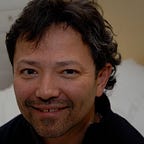Existence as a Process of Becoming 1
Meaning in Life as Creativity
Transcendent Subject
Deleuze was heavily influenced by Sartre’s thought, but fundamentally disagreed with his Kantian notion of the subject.
Sartre retained the transcendent subject in his philosophy and derives his notion of radical freedom via a subject that exists “for itself.”
The world seems strange to us when we are not geared in our projects because we are separated from it, outside the field.
Pre-Individual Ontology
Deleuze’s differences with existentialism go beyond that of transcendent subjectivity to an ontological approach that is pre-individual.
Even Heidegger, who pinned his philosophy to the notion of “being in the world,” and a subject that becomes in the world, kept to a humanistic philosophy in which the individual is the center of analysis.
Consequently, Heidegger’s view of time is human time, not Bergson’s duration that informs Deleuzian ontology.
This begs the question of how we can speak at all of existential concepts being relevant to or consistent with Deleuze’s philosophy of difference.
How might we incorporate existential terms into Deleuze’s thought when his ontology is located in a pre-individual process of the virtual and actual, and not exclusively on human actuality or individuality in the sense we assume when we speak of human existence?
Life as Actualization
As mentioned in previous articles, Deleuze considers life, human life, important.
While the dynamism of his philosophy of difference is located in virtuality and becoming, none of that denigrates or makes inferior the process of actualization.
Human life as the actualization of virtual forces is as much part of the process of becoming as any other aspect of his philosophy.
Human life matters, the affirmation of human life matters, to Deleuze, even though it is actualization, a result or effect of a process of becoming.
Existence as Immanent Change
Human life as actualization is immanent, in the field, subject to change. Once we assume this perspective, we are in a position to interpret existential concepts in a Deleuzian manner.
We start with Kierkegaard and his focus on the individual. There is nothing here other than the recognition of plurality and pure difference, and a rejection of the universal abstract concept.
We can infer in Kierkegaard the primacy of a universe informed by pure difference and the affirmation of life as central.
The singularity of the individual is the pluralism in monism, the rejection of the transcendent universal or unity of Hegel.
Kierkegaard never explicated a principle of difference-in-itself, but his individual is in the world; existence is immanent and nothing other. Kierkegaard rejects any sense of a transcendent or objective meaning in life.
We Create Ourselves
The question is not: what is life?
The central question, the central norm is:
How I might go to the limit of what I am capable of despite lack of an objective meaning in life?
The only meaning in life we might find is in how we do things.
Further, as per Nietzsche, a lack of objective meaning in life is what drives us to create meaning for ourselves.
Meaning in life is subjectivity in the immanent field, participation in change, affirmation of becoming, pure difference.
I hope you enjoyed this article. Thanks for reading!
Tomas
Please join my email list here or email me at tomas@tomasbyrne.com.
Excerpt from my forthcoming book, Becoming: A Life of Pure Difference (Gilles Deleuze and the Philosophy of the New) Copyright © 2021 by Tomas Byrne. Learn more here.
